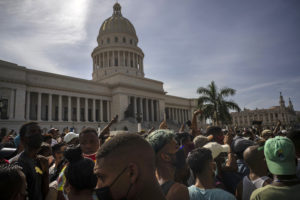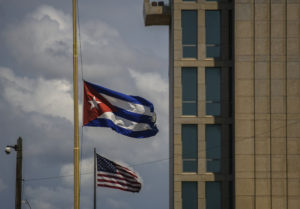WOLA Commentary
By Geoff Thale and Ana Goerdt
President Obama recently recognized that “we have to continue to update our policies” toward Cuba. At a fundraiser in Miami last week, he noted that “…Castro came to power I was just born, so the notion that the same policies that we put in place in 1961 would somehow still be as effective as they are today in the age of the Internet, Google and world travel doesn't make sense."
As innocuous and reasonable as they may sound to the casual observer, these words represent a significant break from the harsh Cold War rhetoric that has dominated U.S.-Cuba policy for decades. The basic framework of our Cuba policy—that is, keeping strict sanctions in place until the Castro brothers are gone, one way or another—hasn’t really changed in fifty years. U.S. policy is predicated on the idea that only regime change can improve the political and economic situation in Cuba, and yet it has done little to nothing to encourage political opening in Cuba. It’s good to hear President Obama recognize that the United States needs to adapt to the times and do something different.
President Obama’s comments are also significant in that they recognize that real changes are being made in Cuba. In recent years, Cuba has embarked on what it calls its own “updating.” The government is moving—albeit gradually and fitfully— toward a more mixed economy, and it has made other important changes, such as the elimination of the exit visa that was previously required to leave the island. Critics have alleged that the reforms are mostly cosmetic and will not be permanent; if last week’s remarks are any indication, President Obama disagrees. If the United States would like to support the process underway in Cuba and see it encompass more political reforms, engagement is the only policy that makes sense.
Engagement with Cuba also makes sense domestically: Polls show that the majority of Americans favor engagement with Cuba, as do Cuban Americans, who have traveled to Cuba in record numbers this year. These views are shared by business leaders, who would like to explore the opportunities for trade and the future of investment, and church leaders, who have in recent months called on the President to change our approach to Cuba.
Of course, it’s unclear from the President’s brief statement exactly how he thinks the United States should update its policy. President Obama said that the United States must be “creative” and “thoughtful” in our approach to Cuba, so let’s hope that he’s thinking about more substantial changes than, say, providing new technology to dissidents with the aim of regime change. Instead, let’s hope that the President has recognized that the United States needs to proactively engage with the Cuba that exists today, and that political and economic reform are more likely to come as a result of visiting, talking, trading, and arguing with Cuba than as a result of sitting on the sidelines and hoping that the government will collapse.
That said, President Obama’s recent comments are encouraging. The U.S. government has taken some modest but important steps forward on Cuba policy this year, including restarting talks on migration and expanding dialogue on issues of mutual interest. Let’s hope that the update the President is now considering will include a shift toward broader engagement through travel, trade, and dialogue.
Geoff Thale is WOLA’s Program Director. Ana Goerdt is WOLA’s Program Officer for Cuba.


